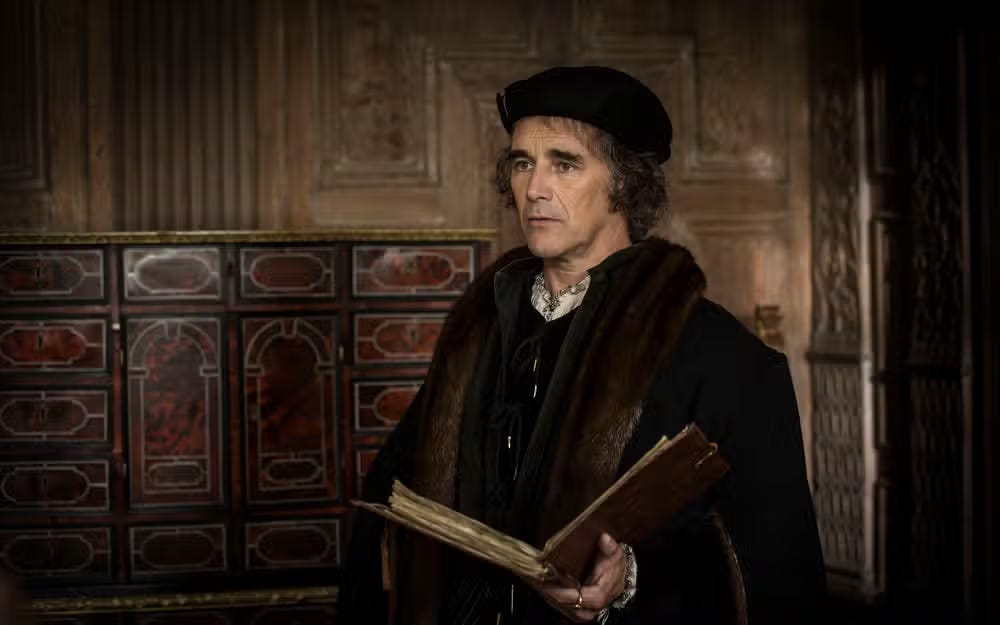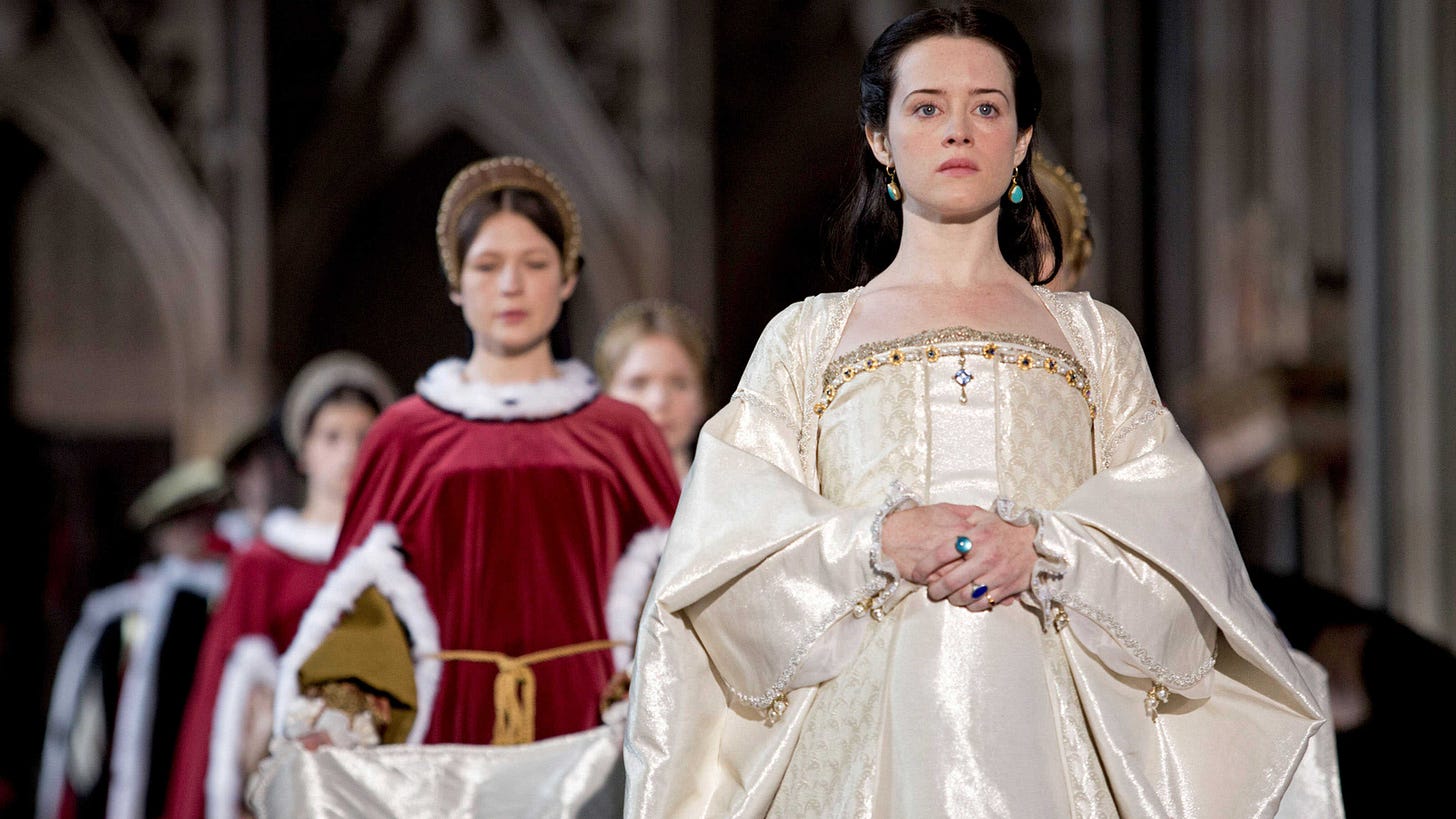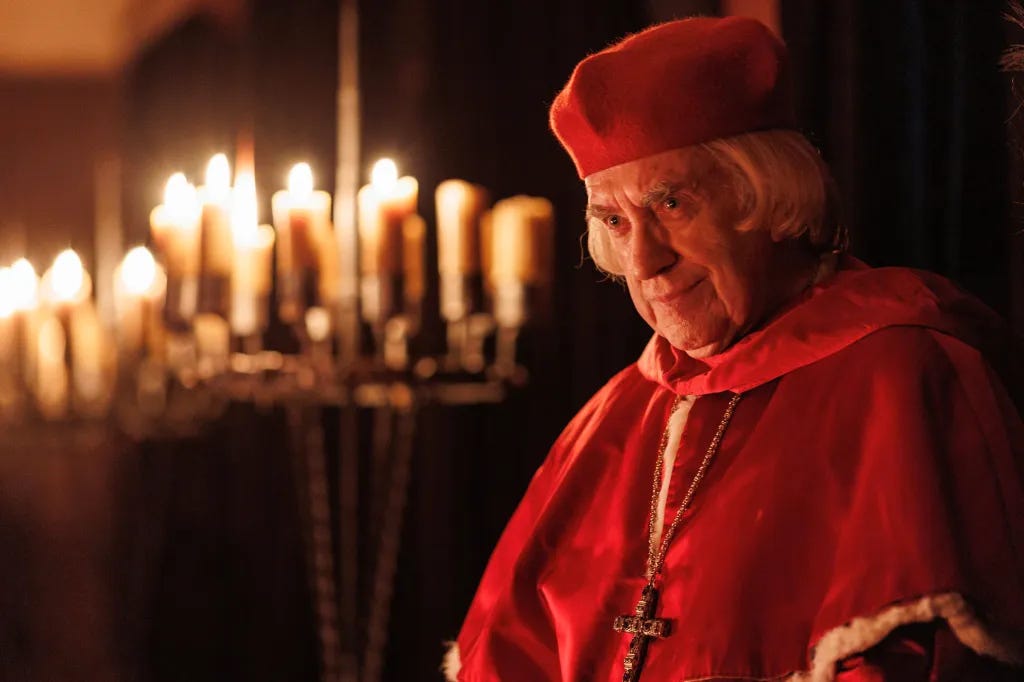Excuse me if I take a bit of a break from politics after two years of continuous political fighting.
But last Sunday post-Election Day, after devouring a meal of grief pasta, still walking wounded, I found shelter from the political storm in, of all places, Wolf Hall. What does stuffy, Eurocentric Masterpiece Theater have to offer an African immigrant grieving the return of a far-right populist buffoon to power? You, dear reader, would be surprised at the universality of human grief expressed in a tale well told. And how edifying such things can be compared against the uselessness of political chatter to affect anything.
The six-part PBS adaptation of Hillary Mantel’s award-winning historical novel on the Court of King Henry the Eighth provided, for me at least, a weekend safe-space to ride out the wall-to-wall cable coverage of the ascension and rumors of ascension of possible Trump cabinet picks. Who needs to subject themselves to torture? The normalization of Trump, 2.0 had already begun and I, quite frankly, have no earthy desire at present to participate. Nor do I have the desire to watch the outrage porn on MSNBC. The next four years will be emotionally and intellectually taxing enough — wisdom lies in picking our battles wisely. Public outrage at each and every Cabinet pick of Trump is abject foolishness at best and a dissipation of one’s precious Chi at worst.
Wolf Hall still runs on Masterpiece Theater every Sunday night, and I recommend it highly as a place of refuge from the psychic devastation of the normalization process of Trump 2.0 taking place in the media. Wolf Hall is a space that I will be enthusiastically inhabiting on Sunday nights for the rest of the run as I regroup, grabbing my second wind in the next great fight against The Great Orange Liar, which will begin in earnest in January, after inauguration.
The first episode of Wolf Hall opens on October, 1529 at York Palace in London. The timeline is contemporaneous with many of Niccolo Machiavelli’s great works on statecraft, fate, the law and human nature. For example, The Mandrake Root, Machiavelli’s pungent five act comedy about the cuckolding of a powerful Florentine aristocrat was published in 1524. And, by contrast, "The Discourses on the Ten Books of Titus Livy," the most explicit exposition on his political philosophy, was published 1531. Sandwiched in between these two widely divergent but unified works we find Thomas Cromwell, in London, assistant to the legendary English statesman and archbishop of York, Cardinal Wolsey, who himself was advisor to King Henry the Eighth.
And so a Machiavellian outlook underlies every aspect of Wolf Hall for it is the zeitgeist, the oxygen that feeds each episode’s screenplay. And the six screenplays are bound tight by the exquisite psychological portrait painted by the late Hillary Mantel, of Thomas Cromwell, a man of his era with more than an average amount of ambition, bearing witness. Cromwell, soon to follow in due time as Lord Great Chamberlain, is perhaps the melancholiest chief protagonist in the history of PBS with the possible exception of Tiberius Claudius Caesar Augustus Germanicus, also known the world over as the beloved, I, Claudius.
While Machiavelli leaves much to chance, which he called Fortuna after the Roman Goddess, Wolf Hall does as well, but in Episode One there is but the briefest hint of the afterlife. I won’t spoil the narrative, but in Episode One we are witness to a great tragedy that befalls Cromwell, one that serves to tie the viewer and the protagonist for the rest of the series. The tragedy offers but the briefest glimpse of a possible hereafter, a ghost on the staircase. Or was it just some sort of optical illusion? Is there a vertical ascent that Machiavelli missed altogether that transcends the physical world? We never get a definitive answer, only glimpses.
The cast is five-star. Mark Rylance, soon be seen in the highly anticipated, Wolf Hall: Mirror and Light sequel, stars as Thomas Cromwell and Damian Lewis, of Homeland, is King Henry VIII. Yet another copper-haired tyrant! This copper-haired tyrant, however, makes no pretense in his immunity to the law, as ours does. He flaunts it loudly and at the open of Episode 1 viewers bear witness to Cardinal Wolsey’s dramatic downfall, precisely because he could not grant the tyrant King what he wanted most in the world, an annulment from his current wife, Catherine of Aragon, with whom he has been married for 24 years without bringing forth an heir. He views that as something of a curse. But is there such a thing as a “curse”? Or is a curse when uttered by a King just a noble lie?
Claire Foy’s Anne Boelyn is unmatched. She, like King Henry, has a Court of her own, with satellites residing at York palace, recently pilfered from the crooked Cardinal. Among those dark stars orbiting Anne is a feral Jessica Raine, formerly of Call the Midwife, playing the tart Lady Jane Rochford, infinitely jealous of her sister’s fortunes. David Robb, who played the unforgettable Germanicus in I, Claudius, is here the patriarch, Sir Thomas Boelyn. Kate Phillips here plays Jane Seymore, but went on afterwards to play unforgettable roles in Peaky Blinders and The Crown. However, the profound sadness of Thomas Cromwell’s face – largely expressed through his eyes – compels the viewer to take a journey with him, into his world of six parts. For as sad as his world actually is, it is far more interesting and compelling than the mirror world we are about to inhabit come January, with our own Orange tyrant.
The profound sadness in Mark Ryland’s eyes as he imbues Thomas Cromwell, a fundamentally principled man surrounded by Machiavellian climbers with a nobility that is not inherited, but earned, sets a poignant tone. The tyranny of Henry, superbly played by Lewis and responded to by the five-star cast, is all the more grotesque when filtered through the funhouse mirror of his lustful, royal whimsy. Cromwell, a Protestant blacksmith’s son, is the King’s fixer. His past is a bit mysterious (and thus worthy of our focus): after leaving his physically abusive father’s house as a child, he lived on the streets, fought with a mercenary army in France, and somehow became a lawyer, then advisor to Wolsey. Everything ultimately Cromwell has comes from the offices of the King. Though Cromwell is low born, he proves himself, by intellect, cunning and skill with a dagger, to be more of a gentleman Courtier than any of the ancient families that consistently refer to him as a “Nobody,” or, even worse, “Butcher’s dog.” Which, no doubt, has to be a part of the sadness that he always carries. Wolf Hall has the good artistic sense not to extend beyond the borders of the television screen. If only Trump’s impending excesses possessed as much self-restraint.
The resting bitch face of Claire Foy here is in full legendary flower. She is exquisite to look at, almost beyond ravishing in that enhancing bustier. Anne Boleyn, the way Foy plays her, can reduce her colleagues to ash with but a withering look. Or, upraise another courtier or lute-playing boy with seductive eyes – a skill said to have been acquired while as a girl in the household of Queen Claude of France, wife of Francis I. Visually, also, the show is a feast, although comparatively low budget, harkening back to the first, lean decades of Masterpiece. Not that that in any way hinders the production.
Quite the contrary. Like in the first lean years of Masterpiece theater – I, Claudius; The First Churchills and Elizabeth R – the lack of a budget meant that the production had to make due with natural lighting and intense close-ups to make up for meager scenery. The meager scenery was offset, largely, by superior theatrical performances and compelling narrative. The premise being that Masterpiece Theater is “theater for the masses,” on the then-young new medium of television.
Instead of cinematic lighting, Wolf Hall is entirely lit by candles, enhancing the aura of sumptuous sixteenth century interiors. And the outdoor scenes are sun-kissed. Peter Kosminsky told the Royal Television Society magazine Television: “With the Arri Alexa camera, for the first time on television it has become possible to shoot exclusively by candlelight.” He continued: “Some scenes were shot with just one candle.” Further, the soundtrack – from Court Masque to Green Grows the Holly – is wholly Tudor or Tudor-inspired music. Slow, plodding and methodically delivered, in the train of Cromwell’s melancholy and the train of Cardinal Wolsey’s incarnadine cassock. Both the candle lighting and the music organic to the age give Wolf Hall the feel of having been dropped into Machiavelli’s zeitgeist, a not entirely uninviting headspace to occupy days after Trump’s victory over Vice President Harris. And yet somehow it works and I found myself transported by the story and my grief pasta.
We cannot fail to note that the show originally aired on BBC2 in 2015, not, surprisingly, on BBC1. Apparently, that is something of a cultural demotion. Kominsky, by the way, was okay with the show receiving what can only be properly construed as second-tier status. “Transmitting it on BBC1 would open it to illegitimate criticism because it is aimed at a thoughtful audience and one prepared to give things a bit more time.” In other words, BBC2 would allow the show to escape a higher scrutiny which could kill a project at the outset. Not that it would have failed on those grounds at all. But it added a certain layer of protection. “Endured, seen and, of course, done/perpetrated. Mantel's genius is to get us so invested in his humanity, and Rylance channels her extraordinary psychological portrait,” is how Sheila Bonufo describes Ryalance’s lead on Twitter. The re-airing of the show at this point in time, in my humble opinion, is the coincidental genius of it all.
Why re-air this classic show now? Well, the sequel “The Mirror and the Light,” Hilary Mantel’s final book, is coming. The re-airing is a reminder that just happens to beautifully transport those suffering over Trump’s win. There are critics that have waited a decade for the sequel. It traces the final four years of Cromwell’s life and ideally would keep us occupied entirely for the four years of Trump’s upcoming buffoonishness.
Alas …






